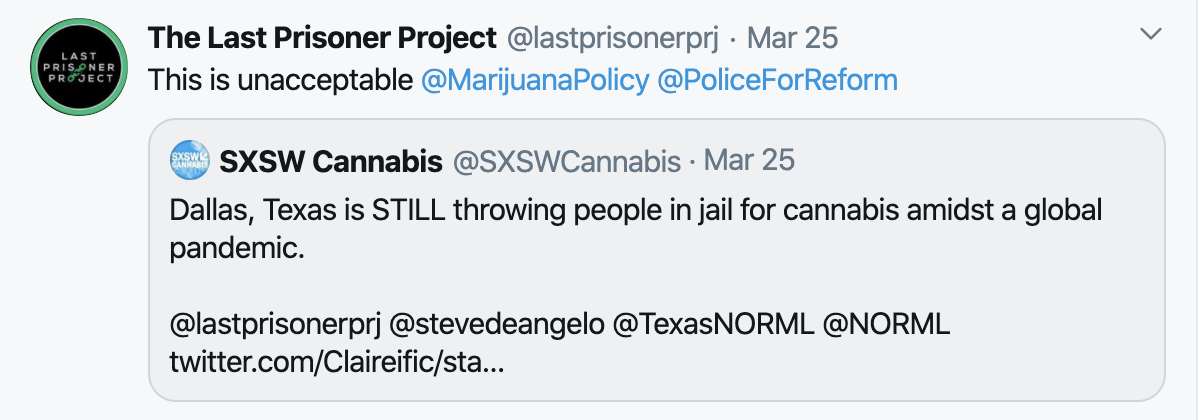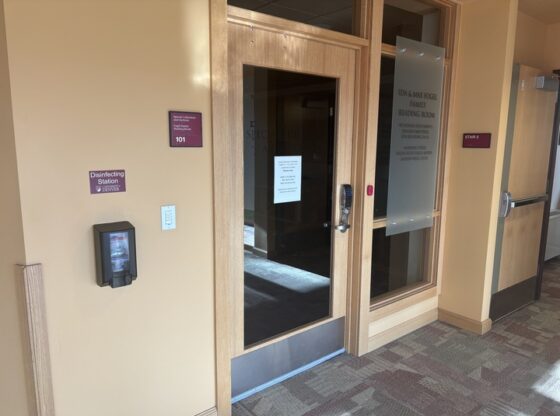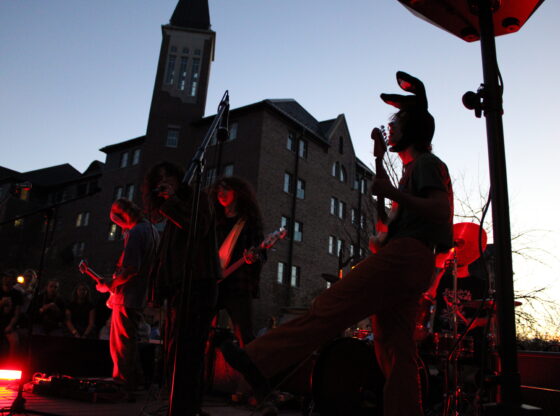As the coronavirus threatens to overtake America’s prisons, advocates plead with the government to release cannabis prisoners.
A multitude of organizations are vying for the release of cannabis prisoners and a halt of cannabis arrests as the COVID-19 pandemic spreads. The Last Prisoner Project, Law Enforcement Action Partnership, National Cannabis Industry Association and National Organization for the Reform of Marijuana Laws have written a letter to a variety of government agencies urging them to heed their request.
These organizations are trying to prevent the mass spread of COVID-19 by vying for the release of nonviolent prisoners, such as people arrested on cannabis charges. They are also calling for the halt of cannabis arrests due to possession, cultivation or sale during this epidemic.
This letter details how many police jurisdictions give some flexibility to what they deem a misdemeanor versus an arrest. These organizations are calling for other jurisdictions to do this as well, specifically for cannabis possession.
The letter describes how jails and prisons, by their very nature, break the CDC’s recommendations of social distancing.
“As you know, prisons and jails are breeding grounds for infections and disease due to close quarters and lack of ability to practice social distancing,” the organizations write in the letter. “While Americans across the country are being encouraged to self-isolate, incarcerated people, by definition, are doing the exact opposite. Thus, all prisoners, whether young or old, are increasingly vulnerable to being infected with the novel coronavirus.”

“Public health officials have been urgently warning that the escalation of this virus in prisons is much worse than it is in the public sphere,” said Violet Cavendish, the Communications Manager for the Marijuana Policy Project in an interview. “They are not able to social distance, which has been recommended, and disease is already known to spread rapidly through jails and prisons.”
The Marijuana Policy Project (MPP) is the nation’s leading organization working to reform marijuana laws across the United States. It is active in state legislatures and has spearheaded many cannabis campaigns. When it comes to the issue of COVID-19 and cannabis prisoners/arrests, they are helping lead the charge.
According to the MPP, inmates have tested positive in California, Louisiana, Massachusetts, Michigan, Missouri, South Dakota and Texas. Prison employees have also tested positive in Alabama, Connecticut, Florida, Illinois, Massachusetts, Vermont and Washington.
Additionally, across the country, law enforcement officers have been subjected to this illness. In the epicenter of the virus, New York City, over 200 NYPD officers have tested positive for COVID-19.
Cavendish explains how preventing the spread of COVID-19 in prisons will not only aid in protecting the prisoners but the public as well.
“It’s in the best interest of prisoners, inmates and staff and their local communities, as well as the greater public to release prisoners that really shouldn’t be in jail in the first place, in our perspective, in order to slow down the rapid increase of this virus spreading as we are seeing,” said Cavendish.
The Last Prisoner Project has interviewed a variety of inmates currently incarcerated on cannabis charges about the current condition of the prisons. On their website, they have a quote from a man named Edwin Rubis, who is serving 40 years for cannabis-related charges. Rubis described the lack of sanitation and precautions taken to prevent the spread of COVID-19.
“The inmates who work in the Unicor factory are still being asked to go to work in-mass numbers every day,” Rubis stated on the LPP website. “They haven’t changed anything concerning cleaning supplies, etc. They don’t allow us any sort of cleaning wipes, bleach, hand sanitizer, etc. No one in here has COVID-19 at this point so we are just waiting for the first staff member to bring it in.”

So far, there have been some changes made to municipal systems in states trying to prevent the mass spread of COVID-19. However, Cavendish explains how most of these places are centers for the coronavirus and that these are not preemptive responses. While some efforts have been made on the state level, the federal government has not made any advances to release nonviolent cannabis prisoners or prevent unnecessary cannabis arrests during this overwhelming time.
Cavendish believes we are running out of time to take action with this issue. She warns that, without immediate change, the state of the prison system will greatly worsen.
“The spreading is already happening, and if action isn’t taken right now—to be honest—we can’t wait any longer,” said Cavendish. “Then, it will continue to spread and will just get worse and worse. It does nothing to help the issue by forcing people to live in so close quarters when they are already more susceptible for contracting diseases in the conditions they live in.”
According to the LPP, over 15.7 million people have been arrested for cannabis-related offenses in the past decade. Currently, there are around 40,000 cannabis prisoners in cells across the country. The LPP website explains the problems behind the cannabis prisoners’ continued incarceration.
“Imagine sitting in a cell for years, decades, or even for life, convicted of an activity that is no longer a crime, while thousands of other people build intergenerational wealth doing exactly the same thing,” wrote the LPP.
While organizations like the LPP project feel strongly about the release of all victimless cannabis prisoners, others caution against calling for this drastic measure.
Mason Tvert, the Vice President of Communications at VS Strategies and seasoned cannabis reform advocate, explains how we have to be careful when calling for the release of all cannabis prisoners in an interview.
“There are certainly people in prison for cannabis-related offenses, by-and-large, they are in certain states with much harsher penalties, and those are becoming fewer and further between, but they are also typically involved in trafficking, large scale cultivation, or they’re in conjunction with other crimes,” said Tvert.
Tvert explained how the cannabis prisoners are not usually imprisoned for solely cannabis, saying, “So it’s not just growing cannabis, it’s growing cannabis and having a bunch of illegal firearms.” He argues that advocates should instead prioritize stopping the arrests and unfair fines ever-present around cannabis.
While the COVID-19 pandemic is ever-changing, the steady rise in cases makes it likely that this illness is going to hit the prison systems. Whether the government decides to release prisoners or curtail arrests could help slow the spread.











